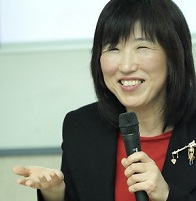
Miyuki Sasaki
Abe Fellowship 2015
Project Title
Effects of web-based communication tasks on the development of a sense of audience in learners of Japanese as an L2 Institutional Affiliation (at time of award)
Professor, Graduate School of Humanities and Social Sciences, Nagoya City University 